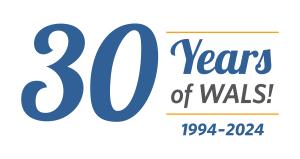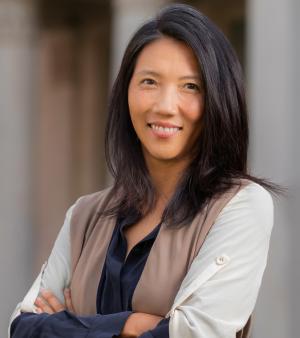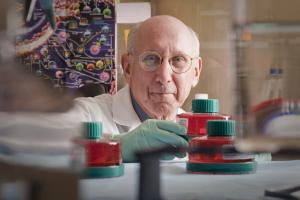Announcements
DIGITAL HEALTH SIG SPEAKER SERIES: “DISRUPTING HEALTH CARE USING DEEP DATA, WEARABLES AND REMOTE MONITORING”

- Wednesday, September 4, 11 a.m.–noon
- Building 10, Room 2, B1C209
- Attend virtually via ZoomGov Meeting
Join Michael Snyder, Stanford B. Ascherman professor of genetics and director of the Stanford Center for Genomics and Personalized Medicine, for the inaugural Digital SIG speaker series lecture.
A pioneer of precision medicine, Snyder has helped develop many technologies in genomics and proteomics including systems biology, RNA sequencing, and protein chip technology. He has initiated a big data approach to health care through his work using “omics” to detect early-stage disease, including wearables to detect infectious diseases like COVID-19, and at-home microsampling to measure hundreds of molecules from a single drop of blood. His lab was the first to perform a large-scale functional genomics project in any organism, and he has published over 800 papers and has co-founded 17 companies. Contact Sherine El-Toukhy at sherine.el-toukhy@nih.gov with questions.
2024–2025 WEDNESDAY AFTERNOON LECTURES

- Most Wednesdays through June; 2–3 p.m.
- Building 10, Lipsett Ampitheater
- Attend virtually at NIH VideoCast
- View the archives dating back more than 20 years
- See the full season on the WALS website
The NIH Director’s Wednesday Afternoon Lecture Series (WALS) is the highest-profile lecture program at the NIH. All lectures are in Lipsett Amphitheater (Building 10) and broadcast via NIH Videocast except where noted. Lectures will be archived.
September 11: Margaret Pittman Lecture: Cryptic (hidden) Changes that Result from Perturbations and Climate Change Shape Future Dynamics of Degenerate Neurons and Circuits; Eve Marder (Brandeis University)
September 18: Biospecific Chemistry for Covalent Linking of Biomacromolecules; Lei Wang (University of California San Francisco, School of Pharmacy)
September 25: Frugal Science: A Toolmakers' Approach for Tackling Problems in Global Health, Ecological Monitoring, and Science Education; Manu Prakash (Stanford University)
October 9: The Science of Connections: Bridging Chromatin Folding, Synaptic Plasticity, and Neurophysiology; Jennifer Phillips-Cremins (University of Pennsylvania)
October 23: How Neuromorphic Computing Can Help us Understand the Brain; Bradley Aimone (Sandia National Laboratories)
October 30: Genomic Surveillance and Characterization of Microbial Threats Facilitates Early Detection and Containment of Disease Outbreaks in West Africa; Christian Happi (Redeemer's University Redemption City, Nigeria)
November 6: Astute Clinician Lecture: Heart of the Matter: Unraveling Cardiovascular Disease in Autoimmune Disorders, Mariana J. Kaplan (NIAMS)
November 20: DeWitt Stetten Jr. Lecture: Molecular Mechanisms Underlying Glycinergic Neurotransmission, Sudha Chakrapani (Case Western Reserve University, School of Medicine)
2024 NIH OBSSR DIRECTOR’S WEBINAR SERIES

- Tuesday, September 17, 2–3 p.m.
- Virtual event
- Subscribe here to receive updates
- Presenter: Emily Wang, Yale University
Emily Wang will present on the topic of justice involved individuals and access to healthcare. Wang is a professor in the Yale School of Medicine and directs the SEICHE Center for Health and Justice. The SEICHE Center is a collaboration between the Yale School of Medicine and Yale Law School working to stimulate community transformation by identifying the legal, policy, and practice levers that can improve the health of individuals and communities impacted by mass incarceration. She leads the Center's research program, the Health Justice Lab, which receives NIH funding to investigate how incarceration influences chronic health conditions, including cardiovascular disease, cancer, and opioid use disorder, and uses a participatory approach to study interventions which mitigate the impacts of incarceration. As an internist, she has cared for thousands of individuals with a history of incarceration and is co-founder of the Transitions Clinic Network, a consortium of 40 community health centers nationwide dedicated to caring for individuals recently released from correctional facilities by employing community health workers with histories of incarceration.
PAST, PRESENT, AND FUTURE OF CELLULAR IMMUNOTHERAPY

- Thursday and Friday, September 26–27
- Building 10, Masur Auditorium
- Click here to register by Sept. 12
This scientific symposium celebrating Steven Rosenberg’s 50 years at NCI will discuss the development of cell therapy for the treatment of human cancer, from early studies to the current state of the art of basic, clinical, and translational research utilizing T cells, T-cell receptors, and chimeric antigen receptors.
NIH LAB MANAGERS WORKING GROUP INFORMATIONAL TALKS
September 26: Vendor Capabilities: Transnetyx and Bio-Rad
- noon-1 p.m.
- Join the virtual meeting on Teams
October 10: Informational talk: Division of Veterinary Resources (DVR) Central Services for the NIH Intramural Research Program
- noon-1 p.m.
- Join the virtual meeting on Teams
October 24: Vendors Capabilities: Curio Bioscience and Canopy Biosciences
- noon-1 p.m.
- Join the virtual meeting on Teams
Contact the NIH Lab Managers Working Group at LMWG@nih.gov with questions.
2024 JUDITH H. GREENBERG EARLY CAREER INVESTIGATOR LECTURE

- Monday, October 7, 1-2 p.m.
- Natcher Building 45, Balcony A
- Attend virtually via Zoom webinar
- Click here for more information and to register
Saad Bhamla will discuss his research in a 30-minute talk titled “Fast and Frugal: Cells That Move Without ATP and Life-Saving Tools That Cost Pennies” on how cells move without ATP and how his lab builds accessible and affordable tools for global health applications, followed by a 30-minute live Q&A. Bhamla is an associate professor of chemical and biomolecular engineering at Georgia Institute of Technology in Atlanta. His interdisciplinary research into the physics of living systems uncovers principles underlying ultrafast movements in biology and informs the design of bioinspired robotics. He’s at the forefront of the emerging field of frugal science to develop affordable and accessible tools for global health applications.
The Judith H. Greenberg Early Career Investigator Lecture highlights the achievements of NIGMS’ early career grantees. Established in 2016 and originally called the NIGMS Director’s Early Career Investigator Lecture, the series was renamed in 2021 to honor NIGMS’ former deputy director Judith H. Greenberg, who retired in 2020 after 45 years of service to NIH.
The lecture is open to everyone in the scientific community. Anyone interested can attend the event via Zoom. Students and trainees working at the NIH campus are encouraged to attend in person to participate in the Q&A following the lecture. Those joining the lecture remotely may turn their cameras on and ask their questions live or submit them via the Zoom chat box. Participants requiring sign language interpretation and/or other reasonable accommodations should submit a request using the NIGMS contact form at least 5 days prior to the event.
NIH DIRECTOR’S SEMINAR SERIES 2024–2025
- Fridays, noon–1 p.m.
- Building 1, Wilson Hall, 3rd Floor
- Attend virtually via NIH VideoCast
October 11: Reviving postmortem studies to clarify infectious diseases pathogenesis, Daniel Chertow (CC)
November 1: Deciphering principals of cell-fate decisions through human disease mutations, Achim Werner (NIDCR)
December 6: Neural and psychological influences on pain and its assessment, Lauren Atlas (NCCIH)
January 10: Unleashing the potential of genomics to unravel Lewy body dementia and related diseases, Sonja Scholz (NINDS)
February 7: Assessing thyroid cancer causes and treatment effects in an era of overdiagnosis, Cari Kitahara (NCI-DCEG)
March 14: Determinants and health consequences of sleep disparities, Chandra Jackson (NIEHS)
April 11: Insights into fetal growth and metabolic health from maternal-placental-fetal genomics, Fasil Tekola-Ayele (NICHD)
May 2: Causes and consequences of tumor heterogeneity: from the bed to the bench-side and back, Anish Thomas (NCI-CCR)
2024 ANITA B. ROBERTS LECTURE: “MOSQUITO IMMUNITY AND MALARIA TRANSMISSION”

- Thursday, November 14, noon–2 p.m.
- Attend virtually via NIH VideoCast
Carolina Barillas-Mury will be the featured speaker at the 2024 Anita Roberts Lecture. Barillas-Mury is chief of the Laboratory of Malaria and Vector Research and a distinguished investigator head of the Mosquito Immunity and Vector Competence Section within NIAID. Her research focuses on mosquito immune responses during Plasmodium infection and beyond. She has published over 100 manuscripts, with several featured in Science and PNAS. Barillas-Mury is a member of the National Academy of Sciences and the National Academy of Medicine and has been awarded numerous awards for her pathbreaking research and research program.
The virtual lecture is open to everyone and will be followed by a reception to talk with the speaker about career issues for women in science, among other topics.
The “Distinguished Women Scientists at NIH” lecture series highlights the outstanding research achievements of women scientists in the NIH Intramural Research Program. The Anita B. Roberts lecture series is sponsored by the NIH Women Scientist Advisors Committee. This seminar is dedicated to Anita Roberts and honors her role as an exceptional mentor and scientist. Roberts joined the NIH in 1976 and became chief of NCI’s Laboratory of Cell Regulation and Carcinogenesis, a role she held from 1995–2006. Roberts left a legacy that impacted all who knew her, both personally and professionally. Not only did she received many awards and accolades for her scientific work, but she was also celebrated for her mentoring and work-life balance skills. The Anita B. Roberts lecture series celebrates both scientific accomplishments and the value of effective mentoring and support.
This page was last updated on Thursday, December 5, 2024
